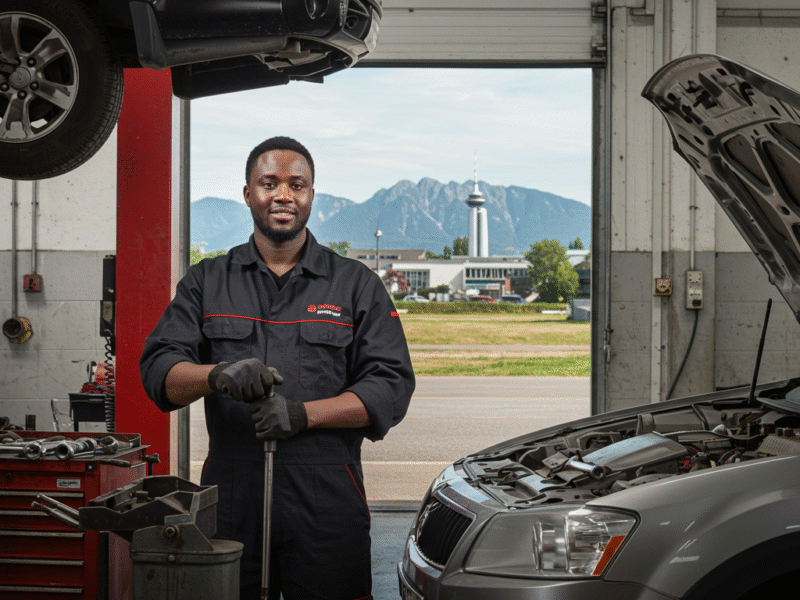Picture yourself trading the bustling streets of Lagos or Abuja for the orderly roads of Germany, where your skills as a mechanic could unlock a high-paying job and a new life abroad. If you’re a Nigerian mechanic dreaming of better opportunities, Germany’s thriving economy and shortage of skilled tradespeople make it a golden destination in 2025. With visa sponsorship programs, German companies are eager to hire talented Nigerians like you to fill critical roles in automotive, heavy-duty, and industrial mechanics. This guide will walk you through everything you need to know about landing these jobs, from the types of positions available to the visa process, salaries, and tips to succeed. Whether you’re fixing cars in a local garage or maintaining heavy machinery, Germany’s doors are open, and this could be your chance to build a brighter future.
Why Germany Needs Mechanics in 2025
A Booming Economy with a Skills Shortage
Germany is one of Europe’s strongest economies, famous for its automotive giants like BMW and Mercedes-Benz, as well as its robust manufacturing and construction sectors. But here’s the catch: the country is facing a serious shortage of skilled workers, especially in trades like mechanics. With an aging workforce and fewer young Germans entering technical fields, companies are turning to international talent to fill the gap. For Nigerians, this is a huge opportunity. Your hands-on experience fixing vehicles or equipment in Nigeria is exactly what employers in cities like Munich, Berlin, and Stuttgart are looking for. Plus, Germany’s immigration policies are designed to make it easier for skilled workers to get visas, often with employer support, opening the door to stable careers and even permanent residency.
The Appeal of Working in Germany
Why pick Germany? It’s not just about the money—though the salaries are impressive. Germany offers a high quality of life, with excellent healthcare, safe cities, and a welcoming, multicultural society. Many Nigerians have already settled there, building thriving communities in places like Berlin and Frankfurt. Mechanic jobs come with perks like paid holidays, health insurance, and chances to learn new skills. In 2025, Germany’s push for green technology, like electric vehicles (EVs), means mechanics with modern expertise are in high demand. If you’ve worked on cars, trucks, or machinery back home, your skills could be your ticket to a well-paid job and a fresh start in Europe.
Types of Mechanic Jobs Available in Germany
Automotive Mechanics: Powering Germany’s Roads
Germany is the heart of Europe’s automotive industry, home to brands like Volkswagen, BMW, and Mercedes-Benz. Automotive mechanics, who repair cars, SUVs, and light trucks, are needed in dealerships, repair shops, and service centers across cities like Frankfurt and Hamburg. If you’ve been diagnosing engine issues or swapping out brakes in a Nigerian garage, this role is a natural fit. Salaries average 15 to 25 EUR per hour, which adds up to about 30,000 to 50,000 EUR a year. With overtime, you could push that to 55,000 EUR or more, making it a great entry point for Nigerians.
Heavy-Duty Mechanics: Supporting Industry
Heavy-duty mechanics work on big machines like construction equipment, agricultural vehicles, and industrial trucks. Germany’s booming construction and manufacturing sectors, especially in regions like Bavaria and Baden-Württemberg, rely heavily on these skills. If you’ve handled heavy equipment in Nigeria, you’re in a great position—pay ranges from 18 to 30 EUR per hour, or 35,000 to 60,000 EUR annually. These jobs often come with visa sponsorship because of the specialized skills required.
Diesel Mechanics: Keeping Logistics Moving
Germany is a logistics powerhouse, moving goods across Europe, so diesel mechanics are always needed. These pros maintain trucks, buses, and generators, ensuring everything runs smoothly. Companies in logistics hubs like Düsseldorf and Leipzig are hiring, offering salaries of 16 to 28 EUR per hour (32,000 to 55,000 EUR yearly). If you’ve worked on diesel engines in Nigeria, you could be a top candidate for these roles.
Specialized Roles: EV and Industrial Mechanics
As Germany races toward sustainable energy, electric vehicle (EV) mechanics are becoming hot commodities. If you’ve got experience with hybrid or electric systems, you could earn 20 to 35 EUR per hour in tech-forward cities like Berlin. Industrial mechanics, who keep factory equipment running, are also in demand in manufacturing regions. These roles pay around 18 to 30 EUR per hour and often include training to help you level up your skills.
Aircraft Mechanics: High-Flying Careers
For those with aviation experience, aircraft mechanics work on planes in major hubs like Frankfurt and Munich. These are highly specialized roles, offering 25 to 40 EUR per hour, which translates to 50,000 to 80,000 EUR annually. While these jobs are rarer, they’re a fantastic option if you have the right qualifications and want top-tier pay.
Salary Expectations for Mechanics in Germany
Competitive Wages in 2025
In 2025, mechanic salaries in Germany are strong due to ongoing labor shortages and rising costs of living. On average, mechanics earn about 18 EUR per hour, but this varies by role and location. Automotive mechanics in cities like Munich start at 15 EUR per hour, while experienced ones can hit 25 EUR. Heavy-duty and diesel mechanics often earn 20 to 30 EUR per hour, especially in industrial areas. EV technicians and aircraft mechanics are at the top, earning up to 40 EUR per hour. Annually, this means salaries range from 30,000 to 80,000 EUR, depending on your experience and specialization.
Additional Benefits
Many mechanic jobs come with extras like relocation allowances, housing support, or sign-on bonuses, especially for sponsored workers. Getting certified through Germany’s IHK (Chamber of Industry and Commerce) can boost your pay by 10-20%. For Nigerians, these salaries are a game-changer—compared to earning 200,000 to 500,000 Naira monthly in Nigeria, Germany’s wages let you send significant remittances home while saving for your future.
Top Regions for Mechanic Jobs in Germany
Bavaria: The Industrial Heartland
Bavaria, home to Munich and companies like BMW, is a top destination for mechanics. Automotive and heavy-duty roles are plentiful, with salaries on the higher end (20-35 EUR/hour). Companies in this region often sponsor visas because of the constant need for skilled tradespeople.
Baden-Württemberg: Automotive and Manufacturing Hub
Baden-Württemberg, where Stuttgart and Mercedes-Benz are based, is another hotspot for automotive and industrial mechanic jobs. Pay ranges from 18 to 30 EUR per hour, and visa sponsorship is common due to the region’s manufacturing strength.
North Rhine-Westphalia: Logistics and Industry
This region, including cities like Düsseldorf and Cologne, is perfect for diesel and heavy-duty mechanics because of its logistics and industrial sectors. Salaries average 16 to 28 EUR per hour, and many employers offer visa support to fill these roles.
Berlin: Tech and EV Opportunities
Berlin’s growing tech scene makes it ideal for EV mechanics and automotive roles. While salaries are slightly lower (15-25 EUR/hour), the city’s vibrant culture and startup energy attract younger Nigerians looking for a dynamic place to live.
Hamburg and Lower Saxony: Maritime and Mixed Roles
Hamburg offers maritime mechanic jobs for ships and port equipment, while Lower Saxony has automotive and industrial opportunities. Pay is competitive, around 18-30 EUR per hour, with sponsorship available in both regions.
Visa Sponsorship for Nigerians
How Germany’s Visa System Works
Germany’s visa process is simpler than many other countries. Unlike some nations, employers don’t need to formally “sponsor” your visa—they provide a job contract, and you apply for a work visa based on that. The Skilled Worker Visa is the main option for mechanics, requiring at least two years of experience or recognized vocational training (check the ANABIN database for equivalence). In 2025, Germany aims to welcome thousands of skilled workers, with trades like mechanics high on the priority list.
Key Visa Options
- Skilled Worker Visa: Ideal for Nigerians with trade experience or qualifications. You need a job offer, proof of experience, and a valid passport. Language skills (B1 German) help but aren’t always required for English-speaking jobs.
- Job Seeker Visa: Lets you stay in Germany for six months to find work. You’ll need proof of funds (about 5,600 EUR) and qualifications. Once you land a job, you can switch to a work visa.
- EU Blue Card: For highly skilled mechanics (e.g., aircraft or EV technicians) with a degree or equivalent experience. Requires a job offer with a minimum salary of 45,300 EUR annually.
Requirements and Process
You’ll need a Nigerian passport (valid for six months beyond travel), proof of qualifications (diploma or trade certificates), work experience letters, and a job offer for most visas. Language tests like TestDaF (German) or IELTS (English, CLB 4-5) may be required. Health and police checks are standard. Visa processing takes 2-6 months, with fees around 75-100 EUR. Employers often help with paperwork or hire relocation agencies to make things easier.
How to Find Mechanic Jobs with Visa Sponsorship
Preparing Your Application
Start by updating your resume to highlight your Nigerian experience—focus on diagnostics, repairs, and safety skills. If you have certifications, like automotive repair training, include them. Germany values practical experience, so even without formal degrees, your work history is valuable. Check if your qualifications are recognized via the ANABIN database or a German trade authority.
Top Job Search Platforms
- Make it in Germany: The official portal lists thousands of jobs, many with visa support.
- Arbeitnow: Great for English-speaking jobs, including mechanic roles with sponsorship.
- LinkedIn: Search “mechanic jobs Germany visa sponsorship” and connect with recruiters.
- Indeed Germany: Use filters for “English-speaking” and “visa sponsorship.”
- Stepstone: Popular for technical roles across Germany.
Companies Hiring Nigerians
Big companies like Siemens, Bosch, and MAN Energy Solutions hire mechanics, often with visa support. Smaller firms like Auto1 Group in Berlin or Krones AG in Bavaria also recruit internationally. Logistics giants like DHL and DB Schenker need diesel mechanics and offer sponsorship. Check their career pages or job boards for openings.
Application Steps
- Check Eligibility: Use Germany’s immigration site or ANABIN to confirm qualifications.
- Take Language Tests: IELTS for English or TestDaF for German (if needed).
- Apply for Jobs: Tailor applications to highlight sponsorship interest.
- Secure Job Offer: Employer provides a contract for visa application.
- Apply for Visa: Submit documents at the German embassy in Nigeria (Lagos or Abuja).
- Relocate: Arrive, start work, and explore PR options after 2-4 years.
Costs include visa fees (75-100 EUR), medicals, and travel. Expect 2-3 months for job offers and 3-6 months for visa processing.
Tips for Success
Stand Out with Skills
The job market is competitive, so highlight unique skills like EV repair or heavy machinery expertise. If you speak basic German (A2-B1), mention it—it’s a big advantage. Online tools like Duolingo can help you learn quickly.
Networking and Community Support
Connect with Nigerian communities in Germany via LinkedIn or groups like Nigerians in Diaspora (NIDO). Reach out to recruiters and mechanics already working in Germany for job leads and advice.
Overcoming Challenges
Germany’s cold winters can be a shock—budget for warm clothing. Language barriers exist, but many jobs are English-speaking. Family separation during visa processing can be tough, but family reunification visas are available once you’re settled. Watch out for fake job offers; only apply through verified platforms or company websites.
Success Stories
A mechanic from Port Harcourt landed a diesel mechanic job in Hamburg via a Job Seeker Visa, now earning 45,000 EUR a year. Another from Lagos works for BMW in Munich, making 55,000 EUR and sponsoring his family. These stories prove that with persistence, you can succeed.
Challenges and How to Prepare
Navigating the Job Market
Germany’s job market is competitive, but your Nigerian experience is a strength. Focus on high-demand sectors like logistics or automotive. Tailor your CV to German standards (one page, professional photo, clear skills).
Cultural and Weather Adjustments
Germany’s work culture values punctuality and precision—qualities many Nigerian mechanics already have. Winters are cold, so invest in proper gear. Learning basic German phrases helps with daily life, even in English-speaking jobs.
Avoiding Scams
Stick to reputable job boards and company websites. Beware of “agents” charging high fees for fake jobs. Verify employers through official sites or the German Chamber of Commerce.
Conclusion: Your Path to Germany
Germany’s need for mechanics in 2025 is a golden opportunity for Nigerians. With high-paying jobs, visa sponsorship, and a clear path to permanent residency, your skills can open doors to a better life. Start preparing now—update your resume, explore job boards, and take that language test. Germany is waiting for you to make your mark. For more details, visit Make it in Germany or search for jobs at Arbeitnow.











